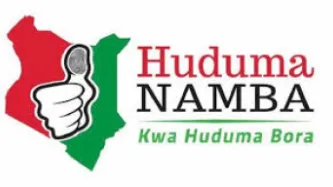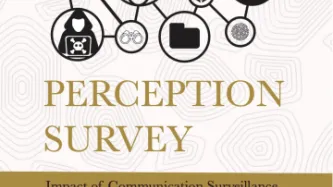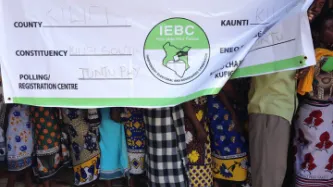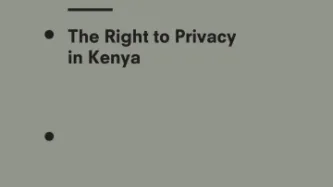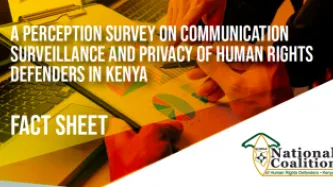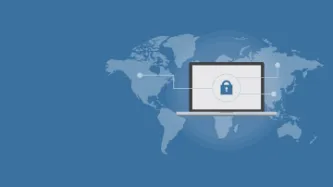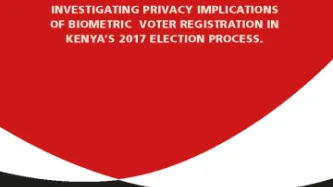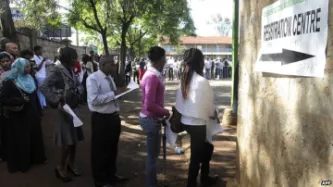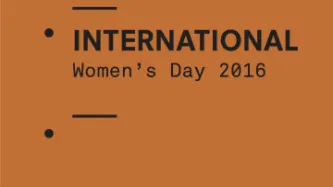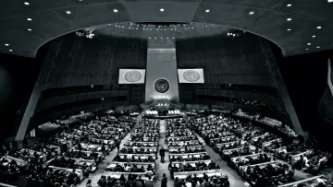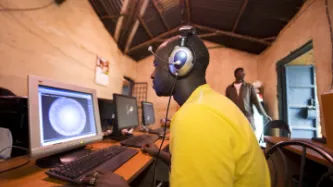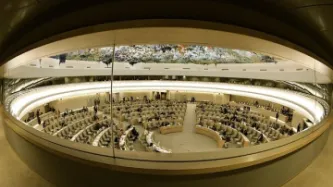Search
Content type: Examples
A former TikTok moderator in Kenya has threatened a lawsuit against TikTok's owner, ByteDance, alleging that he has developed PTSD as a result of his work for the company and that he was unfairly dismissed for advocating for better working conditions. In a letter, his lawyer alleges that the job required him to watch 250 to 350 videos per hour, the vast majority of them "horrific in nature".https://time.com/6293271/tiktok-bytedance-kenya-moderator-lawsuit/ Publication: Time MagazineWriter…
Content type: Examples
Behind every powerful AI system are huge numbers of people labelling and clarifying data to train it, contracted by companies like Remotasks, a subsidiary of Silicon Valley-based data vendor Scale AI, whose customers include the US military and OpenAI. Often the workers, who are assigned tasks they don't understand for a purpose they don't know, are sworn to secrecy. Yet labelling is crucial; it can make the difference between a car stopping to spare the person walking a bike across the road or…
Content type: Examples
More than 150 workers employed by third-party outsourcing companies to provide content moderation for AI tools on Facebook, TikTok, and ChatGPT depend have pledged to create the African Content Moderators Union. The move to create such a union began in 2019 when the outsourcing company Sama fired Facebook content moderator Daniel Motaung for trying to form a union. https://time.com/6275995/chatgpt-facebook-african-workers-union/Publication: TimePublication date: 2023-05-01Writer: Billy…
Content type: Examples
Four people in Kenya have filed a petition calling on the government to investigate conditions for contractors reviewing the content used to train large language models such as OpenAI's ChatGPT. They allege that these are exploitative and have left some former contractors traumatized. The petition relates to a contract between OpenAI and data annotation services company Sama. Content moderation is necessary because LLM algorithms must be trained to recognise prompts that would generate harmful…
Content type: News & Analysis
In a ruling handed down on 14 October 2021 by the High Court of Kenya in relation to an application filed by Katiba Institute calling for a halt to the rollout of the Huduma card in the absence of a data impact assessment, the Kenyan High Court found that the Data Protection Act applied retrospectively.
Background to the case
Huduma Namba as initially proposed
In January 2019, the Kenyan Statute Law (Miscellaneous Amendment) Act No. 18 of 2018 came into effect, introducing a raft of amendments…
Content type: Report
Human rights defenders across the world have been facing increasing threats and harms as result of the use of digital and technological tools used by governments and companies which enable the surveillance, monitoring and tracking of individuals and communities. They are continuously at risk of violence, intimidation and surveillance as a direct consequence of the work they do. Such surveillance has been shown to lead to arbitrary detention, sometimes to torture and possibly to extrajudicial…
Content type: Case Study
The run up to Kenya’s 2017 elections was extremely tense. Kenya has a history of violently fought elections and there was fear this election would be no different. It was in this tense environment, that companies like Cambridge Analytica and Harris Media – and their digital offerings - got involved in the election campaigns.
Cambridge Analytica’s business model is by now familiar, they compiled a huge amount of data points, often through illegal means, to create profiles on individuals –…
Content type: Examples
In order to enforce mandatory 14-day quarantine orders, Kenyan authorities have been tracking mobile phones of people suspected to have COVID-19. Also in Kenya, police enforcement efforts have led to several deaths: three died of injuries from being beaten, one, a 13-year-old boy, was hit by a bullet.
Source: https://www.bbc.co.uk/news/world-africa-52214740
Writer: Dickens Olewe
Publication: BBC News
Content type: Long Read
Background
Kenya’s National Integrated Identity Management Scheme (NIIMS) is a biometric database of the Kenyan population, that will eventually be used to give every person in the country a unique “Huduma Namba” for accessing services. This system has the aim of being the “single point of truth”, a biometric population register of every citizen and resident in the country, that then links to multiple databases across government and, potentially, the private sector.
NIIMS was introduced…
Content type: News & Analysis
On 30 January 2020, Kenya’s High Court handed down its judgment on the validity of the implementation of the National Integrated Identity Management System (NIIMS), known as the Huduma Namba. Privacy International submitted an expert witness testimony in the case. We await the final text of the judgment, but the summaries presented by the judges in Court outline the key findings of the Court. Whilst there is much there that is disappointing, the Court found that the implementation of NIIMS…
Content type: Case Study
On 3 December 2015, four masked men in plainclothes arrested Isnina Musa Sheikh in broad daylight (at around 1 p.m.) as she served customers at her food kiosk in Mandera town, in the North East of Kenya, Human Rights Watch reported. The men didn’t identify themselves but they were carrying pistols and M16 assault rifles, commonly used by Kenyan defence forces and the cars that took her away had their insignia on the doors. Isnina’s body was discovered three days later in a shallow grave about…
Content type: Advocacy
This stakeholder report is a submission by Privacy International (PI), the National Coalition of Human Rights Defenders Kenya (NCHRD-K), The Kenya Legal & Ethical Issues Network on HIV and AIDS (KELIN), and Paradigm Initiative.
PI, NCHRD-K, KELIN, and Paradigm Initiative wish to bring their concerns about the protection and promotion of the right to privacy, and other rights and freedoms that privacy supports, for consideration in Kenya’s upcoming review at the 35th session of the Working…
Content type: Long Read
The Privacy International Network is celebrating Data Privacy Week, where we’ll be talking about how trends in surveillance and data exploitation are increasingly affecting our right to privacy. Join the conversation on Twitter using #dataprivacyweek.
It is often communities who are already the most marginalised who are at risk because of the privacy invasions of data-intensive systems. Across the globe, we see the dangers of identity systems; the harms of online violence against women and the…
Content type: State of Privacy
Table of contents
Introduction
Right to Privacy
Communication Surveillance
Data Protection
Identification Schemes
Policies and Sectoral Initiatives
Introduction
Acknowledgement
The State of Privacy in Kenya is the result of an ongoing collaboration by Privacy International and the National Coalition of Human Rights Defenders - Kenya.
Key Privacy Facts
1. Constitutional privacy protections: Article 31 of the Kenyan Constitution specifically protects the right to privacy.
2. Data…
Content type: Report
In December 2018, the National Coalition of Human Rights Defenders-Kenya published a report analysing the needs and concerns of human rights defenders (HRD) in relation to privacy, data protection and communications surveillance.
A summary of their findings is below. Access the full report on their website.
Content type: Advocacy
This photo originally appeared here.
For years, Privacy International and our partners in Kenya have been promoting the right to privacy in Kenya through research and investigations into government and private sector policies and practices and advocating for the adoption and enforcement of the strongest data protection and privacy safeguards.
The need for Kenya to adopt a comprehensive data protection framework (in addition to strengthening privacy protections in other legislation) has always…
Content type: News & Analysis
As the international cyber security debate searches for new direction, little attention is paid to what is going on in Africa. Stepping over the remains of the UN Group of Governmental Experts, and passing by the boardrooms of Microsoft struggling to deliver their Digital Geneva Convention, African nations are following their own individual paths.
Unfortunately, these paths increasingly prioritise intrusive state surveillance and criminalisation of legitimate expression online as…
Content type: Report
The use of biometric technology in political processes, i.e. the use of peoples’ physical and behavioural characteristics to authenticate claimed identity, has swept across the African region, with 75% of African countries adopting one form or other of biometric technology in their electoral processes. Despite high costs, the adoption of biometrics has not restored the public’s trust in the electoral process, as illustrated by post-election violence and legal challenges to the results of…
Content type: Long Read
In December 2017, Privacy International published an investigation into the use of data and microtargeting during the 2017 Kenyan elections. Cambridge Analytica was one of the companies that featured as part of our investigation.
Due to the recent reporting on Cambridge Analytica and Facebook, we have seen renewed interest in this issue and our investigation. Recently in March of 2018, Channel 4 News featured a report on micro targeting during the 2017 Kenyan Presidential Elections, and the…
Content type: News & Analysis
Overview
CIPIT is currently investigating how the privacy of Kenyan citizens was affected by the use of biometric data during the just concluded 2017 general and repeat elections. The IEBC is mandated by law to register voters, verify their registration details and conduct elections. Accordingly, the IEBC is the custodian of the public voter register. There have been reports that individuals received SMS texts from candidates vying for various political seats during the campaign period of the…
Content type: News & Analysis
Photo Credit: MoD UK
‘Security’ in the policy world has practically no currency without a specific prefix. For example, we could discuss 'national' security as distinct from 'consumer' security or 'energy' security. ‘Cyber’ security is the new prefix on the policy block, and it is gradually forcing a rethink on what it means to be secure in a modern society. In the course of Privacy International’s work globally, we have observed that many governments frame cyber security as national security…
Content type: Long Read
In January 2017, Kenya’s information and communication technology regulator, the Communications Authority of Kenya, announced that it was spending over 2 billion shillings (around 14 million USD) on new initiatives to monitor Kenyans’ communications and regulate their communications devices. The press lit up with claims of spying, and members of Kenya’s ICT community vowed to reject the initiatives as violating Kenyans’ constitutional rights, including the right to privacy (Article 31…
Content type: News & Analysis
Image source: AFP
Earlier this month, the Kenyan daily The Star reported that UK-based data analytics firm Cambridge Analytica had been quietly contracted by President Uhuru Kenyatta’s party in a bid to win himself a second term in office. State House officials were quick to deny the claims, while the company itself issued no comment.
Cambridge Analytica has exploded onto the scene following revelations that its psychometric profiling techniques were used and reportedly played a role in…
Content type: News & Analysis
On a hot day in Nairobi, our researcher is speaking to an officer of Kenya’s National Intelligence Service (NIS). The afternoon is wearing on and the conversation has turned to the presidential elections, taking place in August this year. He has just finished describing the NIS’ highly secret surveillance powers and the disturbing ways in which these powers are deployed.
“It is what you might call ‘acceptable deaths,’” he states about the misuse of communications surveillance powers. “People…
Content type: Report
This investigation focuses on the techniques, tools and culture of Kenyan police and intelligence agencies’ communications surveillance practices. It focuses primarily on the use of surveillance for counterterrorism operations. It contrasts the fiction and reality of how communications content and data is intercepted and how communications data is fed into the cycle of arrests, torture and disappearances.
Communications surveillance is being carried out by Kenyan state actors, essentially…
Content type: News & Analysis
When it comes to tackling corruption, we need to critically engage with the role of technology. One technology in particular is biometrics, a technology that identifies and stores on a database the identity of an individual through some physical characteristic, usually fingerprints or an iris scan. Biometrics is increasingly being used in ID and voter registration schemes. It is a technology that raises privacy and data protection issues but notwithstanding…
Content type: Report
The right to privacy is a qualified right. Gender is not and cannot be its qualification.
For this year’s International Women’s Day, the Privacy International Network is sharing some of its successes as well as the challenges and opportunities we face in at the intersection of gender issues and the right to privacy. Click here to see this feature.
Interferences and violations of the right to privacy, as described in the UN Declaration of Human Rights, affect society as a whole. However,…
Content type: News & Analysis
The focus on the right to privacy continues at the United Nations, with Kenya, Turkey, and Sweden being recently challenged over their surveillance practices during the Human Rights Council's Universal Periodic Review of States' human rights records.
The explicit mention of the right to privacy in recommendations submitted by Slovenia and the Netherlands during the review of Sweden, in the recommendation by Estonia during Turkey's review, and Liechtenstein's recommendations to…
Content type: News & Analysis
The right to privacy is on the frontline of a struggle that has seen a number of other constitutionally protected rights threatened during the last few bloody months of Kenya's ongoing security crisis.
After at least 64 people were killed in two attacks by Al Shabaab militants in late 2014, members of the ruling Jubilee Coalition swiftly moved to introduce an omnibus bill, the Security Laws (Amendment) Bill 2014. The bill, which was hastily enacted into law despite street…
Content type: News & Analysis
What do Egypt, Kenya, Turkey, Guinea, and Sweden have in common? Despite having a Constitutional right to privacy, they are adopting and enforcing policies that directly challenge this human right.
These states are also up for a Universal Periodic Review this year before the United Nations Human Rights Council. UPRs are a mechanism within the Council aimed at improving the human rights situation in all countries and address human rights violations wherever they occur.
Despite having…
